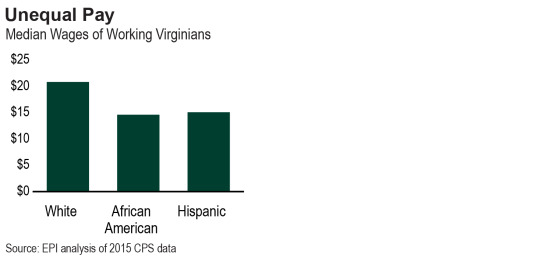August 12, 2016
Shared Challenges: Low Wages
This Saturday the national Fight for 15 movement will rally in Richmond to fight for a $15 minimum wage and “connect to the broader fight for immigrant justice, Black Lives Matter, and against racism.” This rally comes at an important time.
Too many workers, including many African-American and Latino Virginians, are paid too little to support a family. And too many Virginians, including many immigrant, African-American, and Latino families, are living on less than the poverty line, which is just $24,300 for a family of four.
Median wages for Latino and Black Virginians are well below those of non-Hispanic white Virginians. The typical Black and Hispanic worker in Virginia makes only about $15 an hour, compared to $21 for white workers. That means that half of all working Black and Hispanic Virginians make less than $15 an hour. And 3 in 10 Black and Hispanic workers in Virginia make under $12 an hour.

Asian-Americans fare better, and high rates of labor force participation mean Virginia households that are headed by immigrants typically have slightly higher incomes than Virginia households headed by U.S. born citizens. But the success of some immigrants does not mean all immigrant families in Virginia are succeeding financially. Immigrant Virginians are about as likely as U.S. born Virginians to have incomes below the poverty line. And Hispanic and Latino Virginians are much more likely than non-Hispanic white Virginians to have incomes below the poverty line. Poverty rates are even higher for African-American Virginians.
When considering the low wages facing African-American and Hispanic Virginians, discrimination on the part of employers can’t be ignored. Matched-pair experimental studies show employers strongly favor non-Hispanic white applicants over Black applicants, and actually favor white applicants who had recently been released from prison over Black or Latino applicants who were not incarcerated. Black and Latino applicants were also more likely to be channeled to jobs that had less customer interaction and more manual labor. Matched-pair tests also show wage discrimination against Black workers compared to non-hispanic white workers, even after controlling for experience and education. Most studies show that employment discrimination most targets African-Americans, but Latinos also face discrimination compared to white job applicants.
Even when immigrant, Black, and Latino applicants overcome these obstacles and become employed, the discrimination doesn’t stop. Immigrant, Latino, and African-American workers are most often cheated by employers who don’t pay their workers at least minimum wage. While 8 percent of white workers in a multi-city study were paid under the legal minimum wage, 19 percent of Black workers, 33 percent of Latino workers, and 15 percent of Asian or other workers were paid under the minimum wage. And for all immigrants, the rate was 31 percent.
Many immigrant Virginians and Virginians of color could benefit from policy changes to get at these problems. Raising the minimum wage would make sure everyone who works full-time can live above the poverty line. No one should be cheated out of a fair day’s pay, particularly the many Virginians who are already underpaid. And no one should face discrimination because of their race, where they were born, or any other factor. We can do better for working Virginians, especially immigrant and African-American workers who too often aren’t getting a fair chance.
This is the sixth in a series of blog posts based on The Commonwealth Institute’s new report, We’re In This Together: African-American and Immigrant Communities Share Challenges, Policy Solutions. During July and August, we are highlighting analysis and policy ideas from each section of the report. For more information about this report and its findings, please contact Levi Goren at levi@thecommonwealthinstitute.org.
Category:
Immigration
